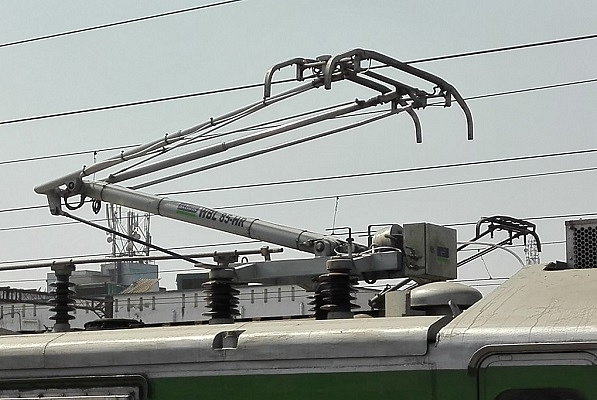News Brief
World Environment Day: Indian Railways On Track To Becoming A Net Zero Carbon Emitter Before 2030
- Capturing the economic benefits of electric traction in an accelerated manner, the Railways has planned to electrify the balance Broad Gauge routes by December 2023 to achieve 100 per cent electrification of BG routes.
- According to the Railways, Head-On-Generation systems, Bio-Toilets and LED lights have recreated the train itself into a travel mode that’s kinder to the environment while maintaining comparable passenger comfort.

The pantograph — which helps in railway locomotion through electricity — thus reducing the carbon footprint.
With a target of zero carbon emissions, Indian Railways has undertaken a series of environment-friendly initiatives including massive electrification, water and paper conservation and bio-toilets, to become the largest green railways in the world.
Besides, steps are being taken for saving animals from being injured on the tracks. Guided by a holistic vision of being environment-friendly, the public transporter has taken efficient and cost effective steps as a modern carrier of passengers as well as freight in order to serve the growing needs of New India.
Railway electrification, which is environment-friendly and reduces pollution, has increased nearly 10 times since 2014.
Capturing the economic benefits of electric traction in an accelerated manner, the Railways has planned to electrify the balance Broad Gauge (BG) routes by December 2023 to achieve 100 per cent electrification of BG routes.
According to the Railways, Head-On-Generation systems, Bio-Toilets and LED lights have recreated the train itself into a travel mode that’s kinder to the environment while maintaining comparable passenger comfort.
Dedicated Freight Corridors are also being developed as a low-carbon green transportation network with a long-term low carbon roadmap, which will enable it to adopt more energy efficient and carbon-friendly technologies, processes and practices.
Railways is implementing two Dedicated Freight Corridor projects — Eastern Corridor (EDFC) from Ludhiana to Dankuni (1,875 km) and Western Corridor (WDFC) from Dadri to Jawaharlal Nehru Port Trust (1,506 km).
The Sonnagar-Dankuni (538 km) portion of the EDFC has been planned for execution on Public Private Partnership (PPP) mode.
Indian Railways' network and reach enabled movement of freight like foodgrains and oxygen in pandemics, even while being more environment-friendly as compared to road transport.
During the period April 2021 to May 2021, the Indian Railways moved 73 lakh tonnes of foodgrains and ran 241 loaded oxygen express trains, moving 922 loaded tankers, thereby transporting 15,046 tonnes of oxygen to various parts of the country.
Continuing its journey of bringing relief by delivering liquid medical oxygen (LMO), the Railways has delivered more than 24,840 MT of LMO in more than 1,463 tankers to various states across the country.
Oxygen Expresses have crossed 10,000 MT of LMO delivery to the southern states of the country.
Railways had signed an MoU with the Confederation of Indian Industry (CII) in July 2016 for facilitation of green initiatives.
Till now, 39 workshops, seven production units, eight loco sheds and one stores depot have been ‘GreenCo’ certified. Green certification mainly covers assessment of parameters having a direct bearing on the environment, such as energy conservation measures, use of renewable energy, GreenHouse Gas emission reduction, water conservation, waste management, material conservation, and recycling among others.
While 19 railway stations have also achieved Green Certification, 27 more railway buildings, offices, campuses and other establishments are also Green certified.
Indian Railways has incorporated climate change features in its own risk assessments and disaster management protocols.
Introducing ElectionsHQ + 50 Ground Reports Project
The 2024 elections might seem easy to guess, but there are some important questions that shouldn't be missed.
Do freebies still sway voters? Do people prioritise infrastructure when voting? How will Punjab vote?
The answers to these questions provide great insights into where we, as a country, are headed in the years to come.
Swarajya is starting a project with an aim to do 50 solid ground stories and a smart commentary service on WhatsApp, a one-of-a-kind. We'd love your support during this election season.
Click below to contribute.
Latest